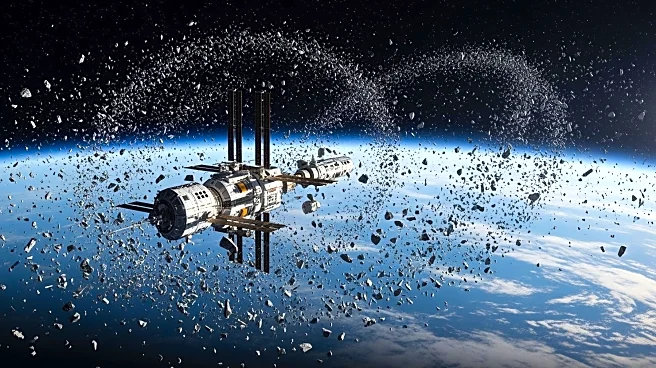What's Happening?
Recent research highlights a growing concern that climate change is exacerbating the problem of space debris. As greenhouse gas emissions increase, they are causing the upper atmosphere to thin, which
in turn reduces the natural drag on satellites and space debris. This drag is crucial for pulling defunct satellites and fragments back into the Earth's atmosphere to burn up. Without it, these objects remain in orbit longer, increasing the risk of collisions. The Massachusetts Institute of Technology (MIT) has modeled these effects, predicting that by the end of the century, some orbital regions may only support 66% of the satellites they currently can. This issue is compounded by the planned launch of thousands of new satellites by companies like SpaceX and Amazon, which could push orbital traffic to its limits.
Why It's Important?
The implications of this research are significant for the future of space exploration and satellite operations. As the natural clean-up mechanism in orbit weakens, the risk of collision cascades increases, where one collision generates debris that leads to further collisions. This could jeopardize the safety and functionality of satellites, which are critical for communication, navigation, and Earth observation. The study underscores the interconnectedness of climate change and space operations, suggesting that efforts to reduce greenhouse gas emissions are not only vital for Earth's climate but also for maintaining a sustainable orbital environment. Failure to address these issues could lead to local debris emergencies becoming a regular occurrence in near-Earth space.
What's Next?
To mitigate these risks, there is a need for coordinated international efforts to manage both satellite launches and greenhouse gas emissions. Policymakers and space agencies may need to implement stricter regulations on satellite deployment and invest in technologies for debris removal. Additionally, global climate policies must consider the impact of emissions on the upper atmosphere. As the space industry continues to grow, balancing technological advancement with environmental stewardship will be crucial to ensuring the long-term viability of space as a resource for humanity.
Beyond the Headlines
This development highlights the ethical responsibility of treating Earth's atmosphere and orbits as shared resources. The study calls for a paradigm shift in how we perceive the relationship between terrestrial activities and space operations. It emphasizes the need for a holistic approach to environmental management that includes both Earth and space. As space becomes increasingly commercialized, the challenge will be to align economic interests with sustainable practices to prevent long-term damage to the orbital environment.











